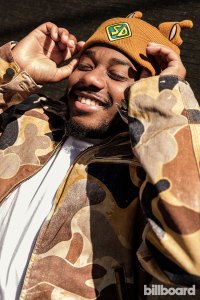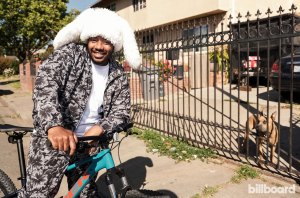How Bay Area Rapper LaRussell Is Including His Fans In a New Model for Independence
Hey man, what’s happening?” LaRussell says exuberantly as he walks down the street on a bright Wednesday morning in the Bay Area.
The passerby who just shouted hello will be the first of several to call out greetings to the 30-year-old rapper as he ambles through his hometown of Vallejo, Calif. “Hey!” “What’s up, brother?” “Hi!” he calls back to them like a particularly neighborly sort of mayor — if mayors wore fuzzy hats embroidered with the face of Winnie the Pooh.
“I walk each morning, and no matter if I’m on this side of Vallejo or the north side where my mom lives or wherever, people are excited to see me,” he says, “because I mean something to this place. I’m someone who really made it who went to the same schools.”
LaRussell isn’t just a local, but a local celebrity — one who has created an innovative, community-focused infrastructure to nurture and forge his artistic independence. He has endeared himself to fans with not only his breezy, conversational flow — delivered over groovy production on an astounding 40 albums going back to 2018 — but also a business model built around sliding scales that allow them to bid on everything from merchandise to concert tickets to royalties to the chance to hang with him and play pickleball.
“In the beginning, I had zero dollars, so I didn’t really need checks and balances. If you gave me a dollar, I was richer than I was prior to that,” he says. “As that elevated, I started finding ways to make it make more sense.”
LaRussell’s success is centered on him being both immensely charming, with a wide and frequent smile that’s certifiably megawatt, and prolific. He says it’s never taken him more than 15 minutes to write a song, and songs come to him frequently, creating a lot of material to monetize. “The universe really gives it to me,” he says. As an independent artist, he has the freedom to determine his own release schedule, which so far in 2025 has included dropping five albums.
“The way labels treat artists where they can only release so much music at a certain time, it’s like you’re telling someone to stop doing what they love and not feed their family,” he says. “Music just kind of oozes out of me. It’s what I do when I’m sad, happy, stressed, so being independent allows me to really cater to how I feel as a human.”

LaRussell
Jessica Chou
LaRussell releases music through Good Compenny, his label and company that’s based in the creative compound he has built in Vallejo. The sprawling space offers rooms and tools for recording, content creation, photography, merch shipping and more, with construction currently underway on a storefront that will sell all things LaRussell, including his first book, Limitless: The 10,000 Shot Theory, a hybrid memoir/self-help tome he calls “a book about life” that has sold thousands of copies since he self-published it in 2023. Upstairs from the work facilities, an eight-unit residential complex houses him and his family, along with a crew of engineers, videographers, managers and protégés like fellow rapper Malachi.
Here the vibe is familial and the ability to create is always just a few doors down the hall. LaRussell equates this hub to building “a store in a place that didn’t have a store. I didn’t know what people liked, but I knew what I loved and what I needed.”
While he considered decamping to New York or Los Angeles earlier in his career, “because you think all the infrastructure is there, so you have to move there to succeed,” he was broke, so moving wasn’t an option. “That encouraged me to build my platforms and my independence here,” he says of Vallejo, a city of roughly 122,000 north of Berkeley. And “here” happens to be a place where he’s now part of an esteemed hip-hop lineage: Vallejo’s native sons also include E-40 and Mac Dre.
Now he’s literally making change in his own backyard through a series of performances he and his team host at the compound, where music, food, drinks and bounce houses for kids are all part of the package for a suggested donation of $100 (though the team has accepted much less; those who can’t afford to pay more are subsidized by those who can).
LaRussell says he doesn’t tour in the traditional sense, although he does perform more intermittent dates “all throughout the year” at venues nationwide ranging in size from 200 to 2,000 capacity. He says intimate spaces “are preferred” — like the NPR Tiny Desk concert he did with a crew of 10 musicians and singers last November that has aggregated hundreds of thousands of views.

LaRussell photographed May 13, 2025 in Vallejo, Calif.
Jessica Chou
For live shows, he accepts almost any ticket offer. “I like everybody to be in the building,” he says, noting that most people do pay more than the minimum, with several tiers of preset ticket prices also listed for most of his shows in traditional venues. The system is roughly the same with merch: His team screens all bids and sends counteroffers if the initial sum is too low. In 2024, Kickstarter recruited him for the Let Me Hold a Dolla campaign, which encouraged people to donate a buck to him en masse. While he initially thought he would decline the offer “because I really go out and work; I don’t like asking for handouts,” he ultimately decided it was OK to ask for “the bare minimum of support.” The campaign ultimately raised $39,423 from 713 backers, with those who donated getting rewards like early access to music, entry to a backyard show and a chance to spend a day with LaRussell.
Collaborators can even bid on LaRussell features, and he has been known to record 10 or 20 in a day. “The minimum I’m getting for a feature is like $500,” he says, “so if I do 20 at just the minimum offer, I’m making 10 grand that day.” Selling portions of his song royalties to fans also generates income: His catalog has 100.2 million on-demand official global streams, according to Luminate.
His proverbial open-door policy to all aspects of his career naturally also leaves him open to the interesting opportunities that come walking in. When one backyard show attendee later became the head of marketing for the San Francisco Giants, she recruited LaRussell to record an anthem for the team to be played at its home, Oracle Park. He wrote the song, “Nothin Like It,” immediately after getting off a Zoom call discussing the project, then “sent it back to the marketing team in like five minutes.” He’s currently working on more music, another book and a comedy in the style of Chappelle’s Show.
But even as his projects expand beyond Vallejo, he knows his wider success is rooted here: Staying part of this community means that as he champions the city, it champions him right back.
“You don’t just see me online rapping,” he says, continuing his stroll through town. “You see me with the kids and in the public. You see me as a human before you see me as a rapper. I think that feeds a different type of support between me and my base.”
This story appears in the June 7, 2025, issue of Billboard.
Powered by Billboard.

